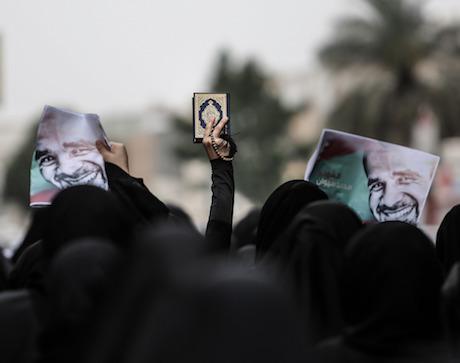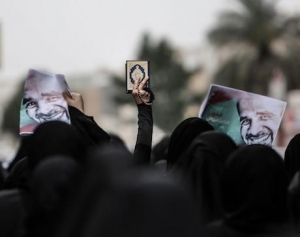Why is Sheikh Nasser signing a declaration of “Religious Tolerance” in Los Angeles when the monarchy has counterintuitively sown sectarian divisions at home?
In September, one of Bahrain’s most prominent young princes traveled to Los Angeles on behalf of his father for what was hailed as an “historic event” for international religious freedom.
Sheikh Nasser bin Hamad Al Khalifa, of the Muslim-majority Kingdom of Bahrain, joined Rabbi Marvin Hier, Founder and Dean of the Simon Wiesenthal Center, to sign the Bahrain Declaration of Religious Tolerance and formally launch the King Hamad Global Centre for Interfaith Dialogue and Peaceful Coexistence.
King Hamad himself followed the event with an editorial in The Washington Times, describing Bahrain as an oasis of religious freedom in the Middle East and summarizing the key tenets of his new declaration:
“It is the responsibility of governments to respect and protect equally both religious minorities and majorities…and there is no room for religious discrimination of any kind.”
But beneath the glamor of Sheikh Nasser’s reception at LA’s Beverly Wilshire Hotel, or the King’s gloss in Beltway newspapers, is a disturbingly different picture – one that clashes almost diametrically with the mirage of the King Hamad Global Centre.
The promotional stories for the prince’s visit, for example, describe him as merely a representative of Bahrain’s official charity, youth, and sports organizations.
What they leave out is that Brigadier General Nasser is also a leading figure in the Bahraini security establishment – and directly implicated in the violent suppression of the country’s Arab Spring protest movement.
As head of the Kingdom’s Olympic Committee, Sheikh Nasser created a special commission to carry out reprisals against athletes determined to have participated in demonstrations, publicly calling for “a wall to fall on [protesters’] heads … even if they are an athlete … Bahrain is an island and there is nowhere to escape.” If it was up to me,” he tweeted, “I’d give them all life [in prison].”
And there’s credible evidence of his involvement in the crackdown extended beyond supervision. Imprisoned opposition figures – including a religious leader of Bahrain’s marginalized Shia Muslim community – have accused the prince of personally torturing them, and, after a Bahraini refugee presented evidence of abuse to British authorities, the High Court in London struck down Sheikh Nasser’s immunity from prosecution in the United Kingdom.
Nevertheless, he’s been awarded for his service in Bahrain, rising through the ranks to command the Kingdom’s Royal Guard, an elite force that’s been deployed as part of the devastating Saudi Arabia-led intervention in Yemen.
Days after he returned from LA, Sheikh Nasser was appointed to the Supreme Defence Council, Bahrain’s highest authority for national security decisions, made up entirely of his relatives in the royal family.
Unlike the UK, the US has taken no steps to open Sheikh Nasser’s record to review despite pressure from the human rights community, so he remains free to attend banquets in LA with impunity.
The protesters he helped crush were calling for basic human rights – like the right to freedom of religion and self-determination – and this didn’t come up on his tour of the Simon Wiesenthal Center’s Museum of Tolerance.
While Bahrain protects the rights of some religious minority groups, the virtually absolute monarchy has counterintuitively sown sectarian division amongst the country’s Muslim majority to undermine the broad based pro-democracy movement.
Specifically, it has long disenfranchised and dispossessed the Kingdom’s Shia Muslim community – which makes up approximately 60-70 percent of the total citizen population.
It is for precisely these reasons that the Bahrain Declaration of Religious Tolerance stands in such stark contrast to remarks made by US Secretary of State, Rex Tillerson, where he cited Bahrain as one of the world’s leading violators of the right to freedom of religion or belief.
Launching the latest installment of the State Department’s International Religious Freedom report last August, Secretary Tillerson stated that “members of the Shia community [in Bahrain] continue to report ongoing discrimination in government employment, education, and the justice system.”
In clear contravention of the King’s new declaration, the State Department found that the Bahraini “government continued to question, detain, and arrest Shia clerics, community members, and opposition politicians.”
The Secretary of State did in fact agree with the King and his son that there is no room for religious intolerance of any kind – concluding unequivocally that “Bahrain must stop discriminating against the Shia communities.”
Bahrain’s “tolerance” campaign also asserts that religious freedom is a “real solution” to the challenge of terrorism, but the government continues to use heavy-handed and discriminatory counter-terror measures to target peaceful dissent.
As noted in the State Department’s latest report on terrorism in Bahrain, the Kingdom’s excessively broad anti-terror legislation “threatens to conflate legitimate prosecutions of militants with politically-motivated actions against mainstream, nonviolent opposition and Shia community, including Shia clerics.”
More still, the security forces tasked with combating terrorism are themselves hotbeds of religious discrimination. The security institutions, including Sheikh Nasser’s Royal Guard, are virtually closed to Shia recruits, with estimates placing the total proportion of Shia personnel at less than five percent.
Deep structural prejudice has fostered extremism, with evidence that officials disseminate sectarian hate speech and hire foreigners that display anti-Shia prejudice.
Such concerns have forced the State Department to cancel American counter-terror support planned for the Bahraini security services.
Just this past June, the US government identified a former Bahraini police official as a Specially Designated Global Terrorist for joining ISIS, and the growing defection of personnel to ISIS led the prominent imprisoned human rights defender Nabeel Rajab to caution that security institutions may serve as an “ideological incubator” for extremist groups.
Meanwhile, journalists have found that the Saudi-led operation in Yemen – in which Sheikh Nasser personally participated – has actually empowered extremist militants like Al-Qaeda and ISIS.
Bahrain’s royals should be calling for religious freedom around the world – but they ought to start by actually implementing these principles at home.


